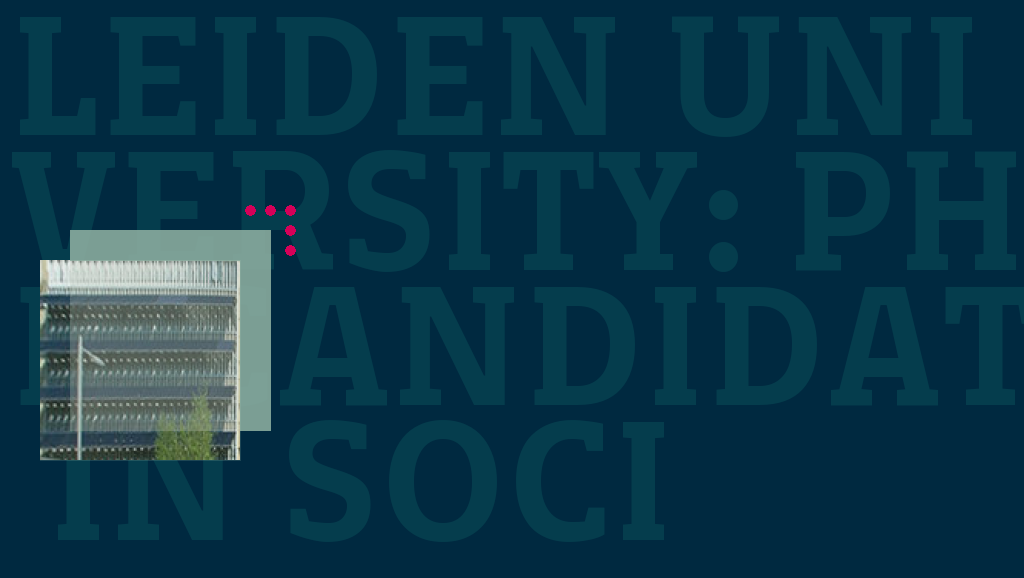Over the past decade, debate has intensified on how research is being funded, practiced, and evaluated. Some of the most visible initiatives include the San Francisco Declaration on Research Assessment (DORA), The Leiden Manifesto for research metrics and The Metric Tide, which have all critically reflected on the role of metrics in evaluation frameworks. As attention is shifting toward designing and implementing a richer pallet of approaches to assessment, a careful analysis of what works and what does not becomes all the more important.
This project studies how this policy shift is translated into organizational practice and how universities develop new evaluation frameworks in two universities (Leiden University and the University of Edinburgh). This research will be undertaken in part by actively contributing to the development of new approaches in various consultancy projects within CWTS B.V. CWTS B.V. is an independent contract research organisation that provides high-quality research performance and evaluation studies. Leiden University’s Centre for Science and Technology Studies forms the core of the company. The project thus includes theorical analyses and reflections, as well as development and testing of novel approaches.
Key Responsibilities and supervision team
The primary task of the PhD candidate will be to study the development of new evaluative frameworks at Leiden University and the University of Edinburgh and to participate in consultancy projects in which CWTS B.V. contributes to (self-)evaluation processes. The latter includes the collaborative development of new evaluative techniques in line with the new evaluative inquiry approach which incorporates quantitative techniques such as Area-Based Connectedness.
The project is part of a strategic partnership between the Universities of Edinburgh and Leiden. The aim is to foster collaboration and to build on existing synergies. The PhD candidate will therefore have a supervisory team with members from each organisation, including Thomas Franssen, Sarah de Rijcke, Niki Vermeulen and Andrew Millar.
Selection criteria
* a Master degree in Science and Technology Studies, Sociology, Organization Studies, Political Science, Public Administration, Anthropology, or a related field;
* a strong interest in the use of and reflection on quantitative (scientometric) and qualitative methods;
* a strong interest in application and intervention through research;
* strong analytical capacity;
* willingness and proven ability to do empirical research independently;
* ability to work in teams;
* willingness to travel and do fieldwork abroad (once restrictions have lifted);
* fluency in spoken English and excellent writing skills in English. Knowledge of the Dutch language is an advantage.
Our organisation
The Faculty of Social and Behavioural Sciences comprises five institutes: Education and Child Studies, Political Science, Psychology and Cultural Anthropology & Development Sociology, and the Centre for Science and Technology Studies. The Faculty is home to 5,000 students and 600 members of staff. Our teaching and research programmes cover diverse topics varying from adoption to political behaviour. For more information, see https://www.universiteitleiden.nl/en/social-behavioural-sciences.
The Centre for Science and Technology Studies (CWTS) is an interdisciplinary research institute that studies scientific research and its connections to technology, innovation, and society. As a leading research, consulting, and training center, CWTS is dedicated to increasing our understanding of scientific quality, societal impact, and other related concepts. CWTS studies the conditions and consequences of research evaluation for the generation of new knowledge, and the role of research in innovation processes. Special attention is paid to the value of bibliometric and scientometric tools to support the evaluation and management of scientific research. On the basis of its research, CWTS wishes to contribute to the debates about the role of science in society. Research at CWTS is organized in three research groups: Quantitative Science Studies (QSS), Science, Technology, and Innovation Studies (STIS), and Science and Evaluation Studies (SES).
The SES research group analyses the politics and practices of research governance, and does systematic empirical research on how formal and informal governance practices (including evaluation) are re-shaping academic knowledge production. The group takes as a starting point that evaluation processes have constitutive potential – they shape those knowledge practices that are claimed to be simply ?assessed? or measured. A crucial societal mission of the group is to contribute to shaping contemporary debates on responsible research governance, evaluation and metrics uses (including policy implications). The research focus of the SES group is part of the research mission of the CWTS, which can be found here: https://www.cwts.nl/research/cwts-research-program-2017-2022
Information
For information about the positions and the project please contact Thomas Franssen by e-mail at t.p.franssen@cwts.leidenuniv.nl
Applications
Applicants should submit online a letter of interest accompanied by a CV. The vacancy and application button can be found here. Closing date is 19 May.
————————–
















